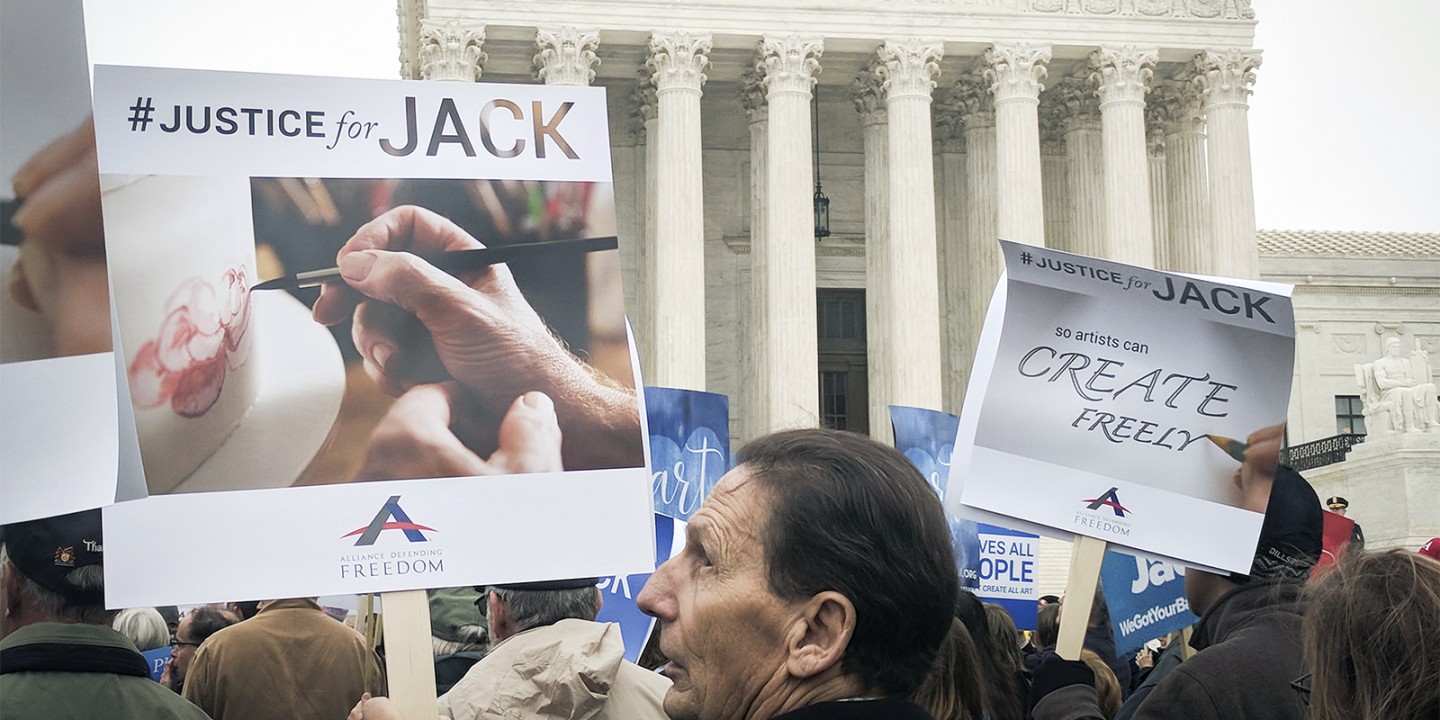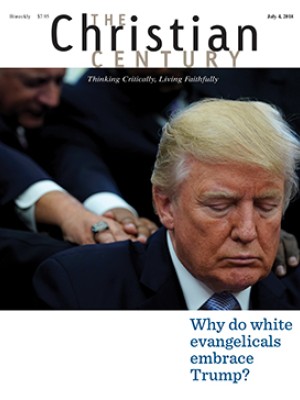Justices hand down narrow ruling for Christian baker in wedding cake case
The Supreme Court majority opinion focused on how a Colorado commission handled the case—leaving open several larger questions.

The U.S. Supreme Court ruled in favor of a Christian baker in Colorado who refused to design a cake for a couple’s same-sex wedding, a case many saw as a contest between claims of religious liberty and LGBTQ rights.
But experts and advocates noted that the ruling handed down on June 4 in Masterpiece Cakeshop v. Colorado Civil Rights Commission—decided in a 7–2 vote—was primarily focused on how the Colorado Civil Rights Commission handled the case. It pushed down the road a definitive treatment of whether religion can be cited as a basis for refusing service to LGBTQ people.
“The Colorado Civil Rights Commission’s consideration of this case was inconsistent with the State’s obligation of religious neutrality,” Justice Anthony Kennedy wrote in the majority opinion, referring to the state authority that sided with the couple after they filed a complaint. “The reason and motive for the baker’s refusal were based on his sincere religious beliefs and convictions.”
Read our latest issue or browse back issues.
In another part of the opinion, Kennedy wrote: “The Civil Rights Commission’s treatment of his case has some elements of a clear and impermissible hostility toward the sincere religious beliefs that motivated his objection.”
The case dates back to 2012, when Masterpiece Cakeshop owner Jack Phillips told David Mullins and Charlie Craig that his Christian faith prohibited him from making a cake for their wedding. Mullins and Craig subsequently filed a complaint with the Civil Rights Commission, which found that the bakery had discriminated against the couple in violation of Colorado law. The case was appealed and eventually made its way to the Supreme Court.
[While supporting Phillips, the court’s majority opinion also stated that gay and lesbian couples must not be treated “as inferior in dignity and worth. For that reason the laws and the Constitution can, and in some instances must, protect them in the exercise of their civil rights.” This includes “equal access to goods, services, and public accommodations.”
Kennedy cited the following comment by a Colorado commissioner—to which other commissioners did not object, according to the hearing record—as evidence that the Colorado commission had disparaged Phillips’s beliefs: “Freedom of religion and religion has been used to justify all kinds of discrimination throughout history, whether it be slavery, whether it be the Holocaust. . . . And to me it is one of the most despicable pieces of rhetoric that people can use to—to use their religion to hurt others.”
Justice Ruth Bader Ginsburg penned a dissent, joined by Justice Sonia Sotomayor, noting that “Craig and Mullins simply requested a wedding cake: they mentioned no message or anything else distinguishing the cake they wanted to buy from any other wedding cake Phillips would have sold.”]
Frederick Gedicks, a professor at Brigham Young University and an expert on religion and law, said the majority opinion sidesteps “a great many serious differences among the justices,” and the precise language obscures larger issues at play.
“It’s a very narrow decision, basically finding that the Colorado Civil Rights Commission was not neutral towards religion, and using the expressions of distaste for Mr. Phillips’ religion as the basis for that,” Gedicks said. “It’s not common for that kind of evidence to exist. What we really want to know, and what we’re really not sure of after this opinion, is what if members of the Colorado Civil Rights Commission had not expressed distaste for religion?”
Anthony Michael Kreis, a visiting assistant professor at Chicago-Kent College of Law whose research involves religious liberty, offered a similar assessment: “This is a decision that is solely about process, but it leaves some of the larger questions open for resolution down the road.”
“Ultimately, the Court ruled that when a state prohibits public accommodation discrimination, the process must be free from overt religious hostility,” he wrote in an email. “Importantly, the Court reaffirmed that there is no general constitutional exemption from civil rights laws just because a person has a religious or philosophical objection to them.”
The American Civil Liberties Union, which represented Craig and Mullins during appeals, wrote on social media, “The Supreme Court did not rule that there is a constitutional right to discriminate.”
Louise Melling, deputy legal director of the ACLU, elaborated in a press release: “The court reversed the Masterpiece Cakeshop decision based on concerns unique to the case but reaffirmed its long-standing rule that states can prevent the harms of discrimination in the marketplace, including against LGBT people.”
Nevertheless, Alliance Defending Freedom, a legal firm that represented Phillips in the early stages of the case, issued a statement celebrating the decision. Kristen Waggoner, who oversees the ADF’s U.S. legal division, said, “Creative professionals who serve all people should be free to create art consistent with their convictions without the threat of government punishment.” —Religion News Service
A version of this article, which was edited on June 15, appears in the print edition under the title “Justices back cake baker in narrow ruling.”






